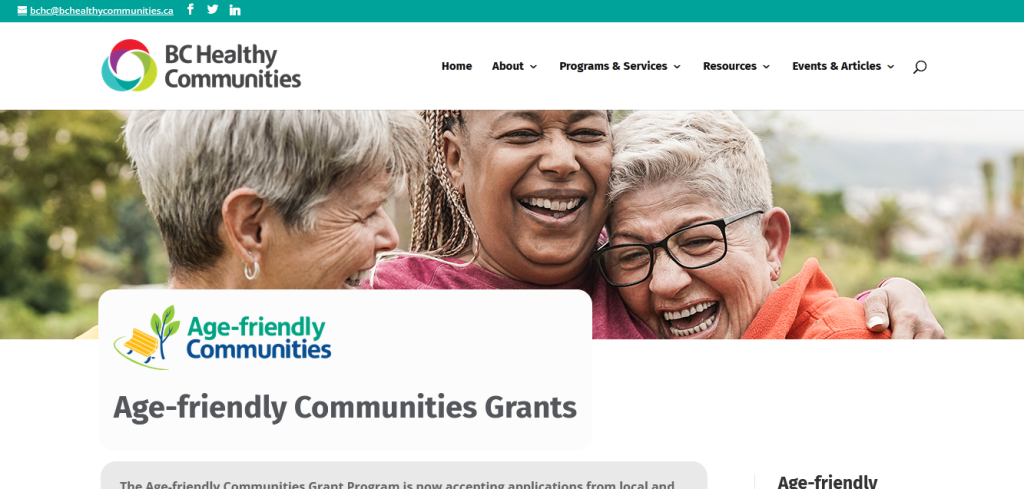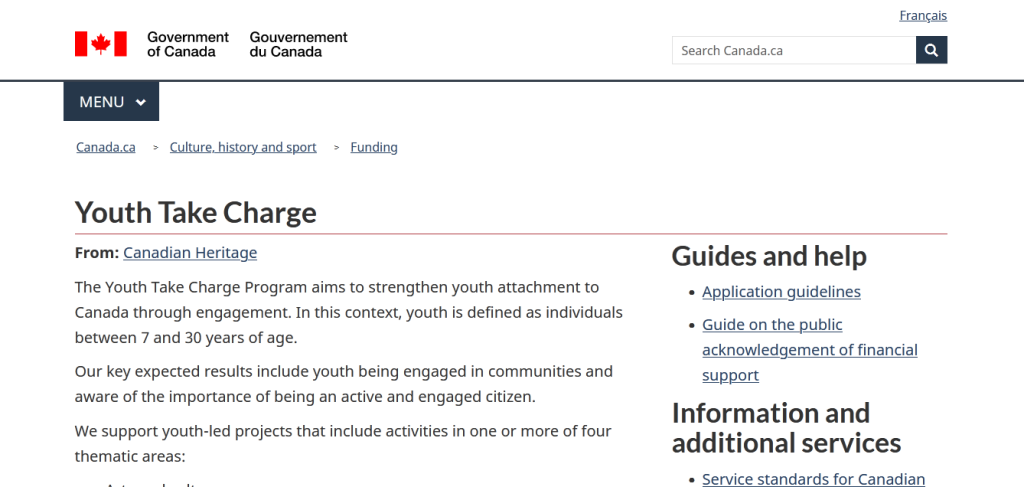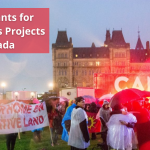Communities in British Columbia are encouraged to support elders so they may live active and independent lives, with a new round of age-friendly funding worth $500,000 up for grabs.
“As the population of British Columbia grows, so are the number of seniors, and our government is working to ensure that older persons have access to the services and supports they require,” said Adrian Dix, Minister of Health. “Age-friendly grants assist the elderly in remaining self-sufficient, and I hope Indigenous and local communities apply.”
The initiative is a collaboration between the provincial government and the BC Healthy Communities Society (BCHC), which will manage the revamped grant programme. The Union of BC Municipalities previously handled the Age-friendly Communities funding programme.
Local and Indigenous governments have until July 5, 2022, to apply to the BCHC for funds 2022. They can apply for a $25,000 Stream 1 grant for age-friendly assessments and action plans or a $15,000 Stream 2 award for age-friendly projects.
Mable Elmore, Parliamentary Secretary for Elderly Services and Long-Term Care said, “I encourage towns to apply for an age-friendly fund to support our seniors.” “The age-friendly program’s opportunities are critical in ensuring seniors feel connected to their community.”
Equity, sustainability, and the formation of multi-sectoral partnerships are examples of age-friendly planning priorities. Projects include accessible and safe public places, parks, and nature trails, as well as strategies and plans to fulfil the housing, transportation, climatic, and emergency-management needs of a varied population of elders in the community.
“We are ecstatic to administer the Age-friendly Communities award programme, which includes facilitated capacity-building support,” said Jodi Mucha, BCHC executive director. “Given that BC’s ageing population is the fastest-growing group, age-friendly community design and implementation is more important than ever.”
Age-friendly funding was awarded to 40 towns in 2020, up from 35 in 2019.
Read more about Nova Scotia Grant to Low-Income Seniors
Communities that have taken measures toward becoming age-friendly receive formal certification as an age-friendly British Columbia municipalities from the province.
In 2021 and 2022, four towns will be recognized for becoming age-friendly, indicating that they are taking steps to guarantee that elders in British Columbia may live active, socially engaged, and independent lives. Quesnel, Warfield, Port Moody, and Oliver have each earned a digital badge on their websites and other advertising materials to showcase their status. They will be asked to participate in a national and international network of age-friendly communities. There are now 61 officially certified age-friendly communities in British Columbia, up from 47 in 2018.
BCHC is a non-profit organization that promotes the development of healthy, flourishing, and resilient communities across the province. BCHC has been delivering the program’s capacity-building component in collaboration with the province since 2015.
Local and Indigenous governments can now apply for the Age-friendly Communities Grant Program for the 2022 grant cycle. The application deadline is July 5, 2022.
What Is an Age-friendly Community?
Age-friendly neighbourhoods promote healthy, safe, and equitable ageing, allowing seniors to age. These communities realize that older people have a wide range of abilities and resources and respond to their needs while removing physical and social barriers to inclusion. Age-friendly communities, on the other hand, benefit all demographics and groups, as safer, more inclusive planning and infrastructure benefit all.
The creation of age-friendly communities in British Columbia builds on global findings from the World Health Organization’s Age-friendly Cities and the Canadian Age-friendly Rural and Remote Communities initiatives, completed in 2007.
Age-friendly Community Well-being and Health
British Columbians are among the healthiest people in the world in general, yet not everyone has equal access to health. We know that encouraging people to adopt healthy habits is insufficient unless the social, economic, and physical settings in which they live are also designed to promote health and well-being.
According to research, 60 and 75 percent of the things that influence our health occur outside the hospital system. These factors exist in the communities where we live, work, learn, age, and play and include transportation, available recreation alternatives, supportive social networks, community design, and availability of healthy food.
Grant Program Information
BC Healthy Communities (BCHC) delivers the Age-friendly Communities Grant Program in collaboration with the BC Ministry of Health (MoH), financed by the MoH.
Older persons in an age-friendly community are encouraged to age in place, leading active, socially involved, and independent lives. The Age-friendly Communities Grant Program comprises the following components to assist local and Indigenous governments in achieving their aim of creating age-friendly communities:
Financial Awards, as well as in-kind, Customised Age-friendly Capacity Building Assistance
There are two types of grants available. Local and Indigenous governments are encouraged to apply for financing under Stream 1: Planning ($25,000 maximum) or Stream 2: Projects ($15,000 maximum).
We provide tools and resources to promote age-friendly planning and projects in addition to the funding programme.
The online webform is used to submit applications.
Before applying, applicants should read the application guide and evaluate the programme specifics, eligibility criteria, and application procedures.
Dates to Remember
- The application deadline is July 5, 2022, at midnight PT.
- Applicants are notified of the results in late August 2022.
- Projects take place between September 2022 and September 2023.
- The final report is due on October 1, 2023.
Eligibility
Applicants must be from one of the following government agencies:
- Bands of Indigenous Peoples
- Tribal Councils of First Nations
- Municipalities Regional Districts of Métis Chartered Communities
- Self-Governing First Nations
Applications must include the following information:
- a proposed budget that shows how the proposed expenditures match with the plan or project; a high-level work plan; and a resolution by the local government council/board, band council, or similar.
- It is encouraged, but not needed, to obtain a letter of support from your regional health authority or the First Nations Health Authority (FNHA). Please note that projects demonstrating cross-sector collaboration are more likely to receive funding.
As a demonstration of current partnerships, written letters of support are suggested. If you have any questions or would like to schedule a call, please e-mail [email protected].
Stream 1 (up to $25,000): Planning
The Planning grant stream allows Indigenous and local governments to demonstrate an age-friendly approach to all areas of the planning process, laying the groundwork for future Stream 2: Projects funds to succeed.
Creating a local age-friendly evaluation and action plan; and/or incorporating an age-friendly and equitable lens into existing plans or policies, such as:
- Comprehensive Community Plans, Official Community Plans, and community or neighbourhood plans;
- Plans, arrangements, or agreements for reconciliation;
- Zoning and other ordinances (such as subdivision, snow clearing, and parking);
- Community health and wellness plans, development permit requirements
- Plans for emergency response, evacuation, and/or social assistance; and/or
- Food security/food systems planning, design principles, active transportation planning
- Community planning processes involve social determinants of health (e.g., affordable housing, homelessness, etc.).
Stream 2: Projects (up to $15,000)
The Projects stream funds one or more of the actions (projects) selected during the Planning phase. Applicants must have completed an age-friendly assessment and action plan under the Stream 1: Planning grant to be eligible for Stream 2: Projects grant funding. Applicants with an established age-friendly evaluation and action plan can apply directly for Stream 2: Projects funding.
Requirements for Applications
Each of the eight domains of an age-friendly community must be addressed in one or more of the Stream 1 and Stream 2 applications. The age-friendly physical and social environment domains are aligned with the WHO’s Age-friendly Cities initiative and the Canadian Age-friendly Rural & Remote Communities project. Please notice that the British Columbia language has been modified to make it more inclusive.
- Buildings and outdoor spaces
- Traffic safety, as well as transportation
- Housing
- Participation and social well-being
- Cultural safety, social inclusion, and respect
- Participation in the community and employment
- Community support and health and wellness programmes, as well as communication and information
The application must include a budget outline explaining how the proposed expenditures relate to the programme.
A work plan with major milestones and project leads must be included in the application. A local government council/board resolution, band council resolution, or equivalent endorsing the programme, as well as a commitment to provide overall grant management, must be included in the application.
The application must be submitted online through BC Healthy Communities. Please e-mail us at [email protected] if you have any problems submitting online. Incomplete applications are less likely to succeed and score lower than complete applications. An Adjudication Committee will rate applications using a weighted point system.
Budget and Workplan
You can get a budget and work plan template here. Save the file with the name “COMMUNITY NAME AFC WorkplanBudget 2022.” Examples of completing these documents can be found in Section 5.0 of the application handbook.
- The project work plan provides a high-level overview of projected project milestones, roles, and BCHC support (see age-friendly capacity building supports above or Section 4.6 of the application guide for a list of potential BCHC Staff Supports). We appreciate that procedures aren’t always linear, which helps our staff better comprehend your project idea. The following expenses are covered:
- Coordination, facilitation, collaboration building, and student-led research are examples of project staff.
- Promotional materials, printing, and design are examples of communications.
- Expenses incurred by indigenous governments, municipal governments, and community partners in attending multi-sectoral partnership meetings and events (e.g. venue, travel miles, food, lodging, and child care);
- Asset mapping and environmental audits are examples of data collection.
- Honoraria to alleviate voluntary participation hurdles; and
- (Only for Stream 2) Construction expenses that are linked to initiatives and programmes for older persons may be included and authorized, as long as they do not exceed 40% of the total Stream 2 grant requested (for example, 40% of a $15,000.00 grant request might allow for a maximum of $6,000.00 in capital costs).
The following expenses are not covered:
- Expenses incurred for previously completed activity;
- Unless you’re trying to extend or increase proven impacts, existing community programmes;
- Personal spending or entertainment;
- feasibility studies, business cases, architectural, engineering, or other design drawings for the development or refurbishment of facilities that provide services to older persons, such as housing and care facilities;
- Fundraising;
- Construction or renovations to sidewalks, paths, or trails, as well as other infrastructure projects;
- One-time events (e.g., community dinners, festivals, or community gardens) that are not part of a larger age-friendly community strategy; and
- Equipment and other capital expenses account for over 40% of the project budget.
Furthermore, previous age-friendly communities grant recipients must have completed and satisfied all previous reporting obligations for all types of grant funding received.
Age-friendly Communities Grants
Grant recipients must engage in an onboarding call at the start of the project and submit a final report at the conclusion.
Successful applicants will be scheduled for an onboarding call with BCHC personnel to introduce themselves and identify how they can best assist you.
Now, below are some other age-friendly grants you can refer to:
Youth Take Charge by Department of Canadian Heritage
Through engagement, the Youth Take Charge Program strives to promote youth attachment to Canada. Youth engagement in communities and awareness of the necessity of being an active and engaged citizen are two of our expected primary outcomes. In this perspective, individuals between the ages of 7 and 30 are considered youth. We support groups that deliver youth-led initiatives that demonstrate their ability to increase young attachment to Canada and include activities in one or more of four themes:
- Culture and the arts
- Youth service and civic engagement
- Economic pursuits
- Heritage and history
Applicants who qualify:
- A registered non-profit organization in Canada.
- A recognized charitable organization in Canada.
- a group that represents indigenous peoples
- Have at least three years of experience working with youth on a national or provincial/territorial level. A lot of things influence this, including:
- Geographic reach: your activities extend beyond your immediate neighbourhood.
- You directly engage a significant number of youth annually, which has a demographic impact.
- Have proper security and safety rules and procedures that demonstrate the nature and duration of your youth programme delivery experience.
Submission Deadline: August 1
Contact:
- Phone Number: 819-997-0055
- E-mail Address: [email protected]
Everybody Gets to Play by Canadian Parks and Recreation Association
The Canadian Parks and Recreation Association’s Everybody Gets to Play campaign strives to make recreation accessible to children and teens from low-income homes across Canada. The Alberta Recreation and Parks Association, as the initiative’s provincial provider, conducts research to support recreation accessibility advocacy.
Recreation is a fundamental human right. According to the United Nations and the governments of Canada, all children and youth have the right to participate in age-appropriate play and leisure activities.
Recreation is critical to human growth. Recreation can improve physical, social, and psychological skills, resilience, mental health, self-esteem, and other adult strengths.
What options do we have?
As a recreation industry, we must guarantee that recreational opportunities are available to all Albertans. Increasing accessibility necessitates a shift in mindset and a commitment to providing affordable options for everyone in the community.
Applicants who qualify
- Recreational opportunities
- Municipalities
- Organizations that help young people
Submission Deadline: Ongoing
Contact
- Contact Name: Pamela Jones
- Phone Number: 780-638-2915
- E-mail Address: [email protected]
Bottom Line
In 2007, the World Health Organization developed an Age-Friendly Cities Framework, recognizing population ageing as a major force affecting the twenty-first century. It proposes eight overlapping themes to assist in identifying the difficulties that older individuals experience in their communities.
Age-friendly neighbourhoods promote healthy, secure, and equitable ageing. These communities realize that older people have a wide range of abilities and resources and respond to their needs while removing physical and social barriers to inclusion. Age-friendly communities, on the other hand, benefit all demographics and groups, as safer, more inclusive planning and infrastructure benefit all.
The development of age-friendly communities in British Columbia is based on the WHO’s results and the Canadian Age-friendly Rural and Remote Communities project. The provincial government and health authorities have assisted local governments in developing age-friendly communities since 2007. By 2031, over 1.5 billion people, or a quarter of the province’s population, would be over 65, making this an ever-growing and vital endeavour.









Leave a Reply